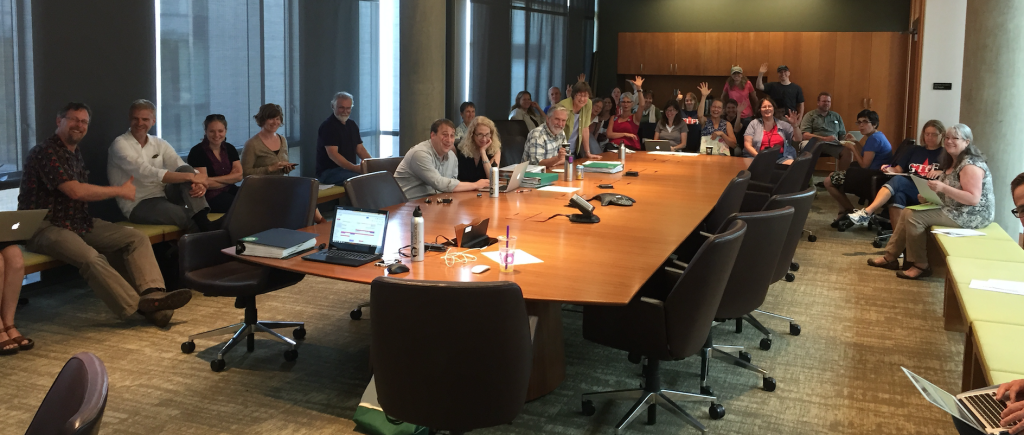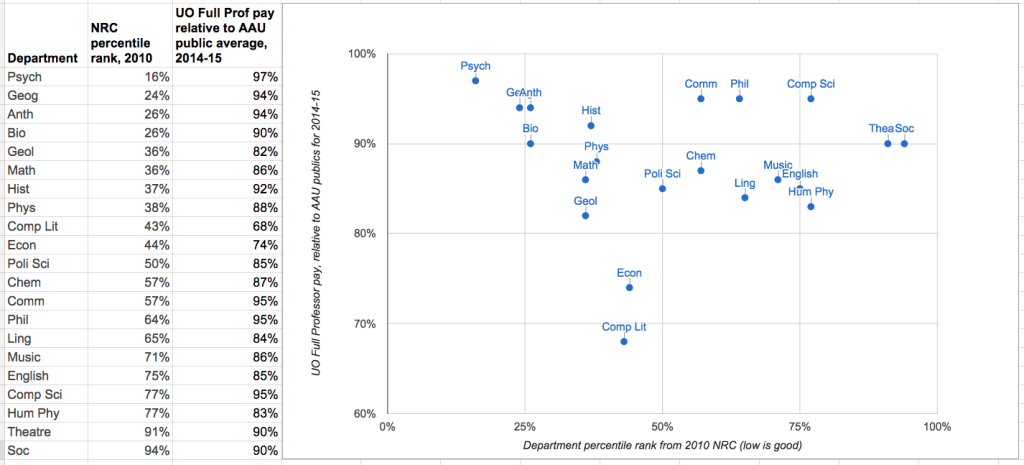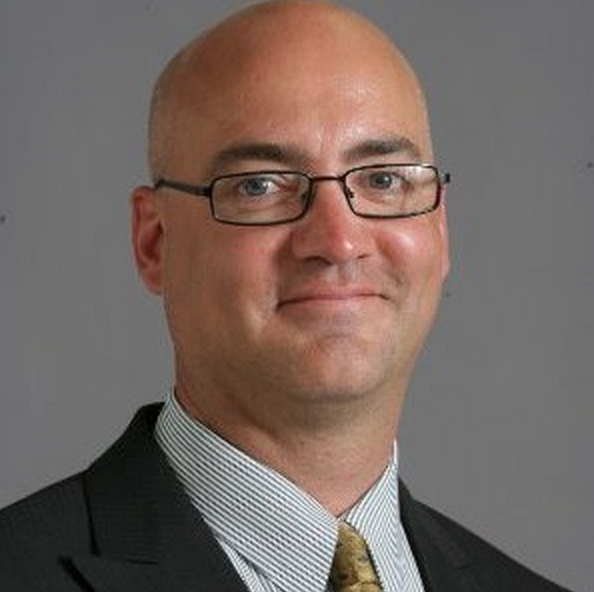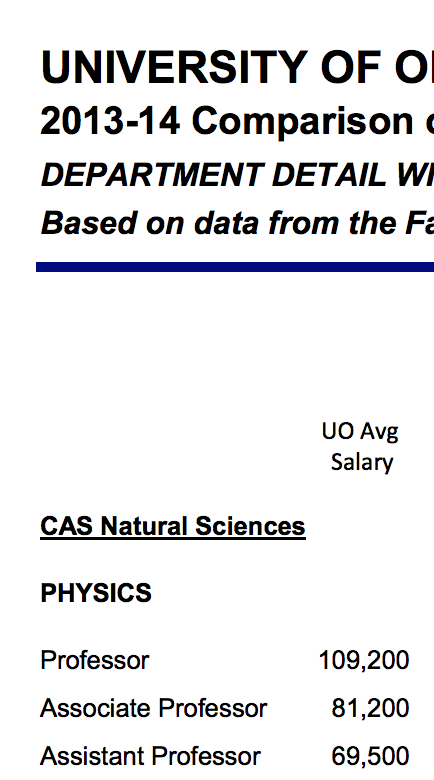Just kidding, I don’t know why our provost didn’t give United Academics any credit for these raises in this email, sent round today. One of the more unexpected aspects of both this and the 2014 bargaining was that it was the *union* that kept pushing for merit increases, while the administration wanted…
Posts tagged as “2015 bargaining”
Provost Coltrane announces raises!
Coltrane’s not giving our faculty union any credit for these raises, but at least he’s not blaming the union, so I guess that’s progress: To: All Faculty From: Scott Coltrane, Provost and Senior Vice President Date: November 2, 2015 Re: FY 2016 Compensation Increases I would like to share with you the…
Bob Berdahl tried to bust the union. Mike Schill invited the union over to his place to celebrate the new CBA.
Here’s the April 2012 letter to Governor Kitzhaber from one of his policy advisors, telling him that Interim UO President Bob Berdahl had hired an out of state firm to try and bust the union, and that UO was not being completely honest about that: All in all UO paid about $1M to Curiale, Hirschfeld,…
2015 faculty union CBA ratified with 97% yes vote
Update: The votes are counted, it’s a vote of confidence in the union and its bargaining team. The contract runs until June 30th 2018, so bargaining for the next contract won’t start for a bit more than two years.
10/9/2015: Pres Schill and union will trade beef for ratification vote
Word down at the faculty club last night is that President Schill returned from the Pendleton Roundup with a herd of shorthorn beeves that he and the union leadership drove across Santiam Pass, down to the fecund grass of Autzen Stadium, where they’ve been fattening up for weeks.
Now they’re offering 1/2 side of beef, cut and wrapped, for union ratification votes. (Or $650 in your next paycheck.) So get down to the union office, conveniently located above the Noodlehead on 13th, sign a membership card, and get your vote in.
UO to study external equity, market compensation comparisons
This is for the OA’s. Great idea. Details here: OA Classification and Compensation Project The purpose of this project is to establish a classification and compensation system for OAs enabling UO to be competitive in the market, to attract and retain talent, and to be able to reward top performers.…
Diane Dietz is back with report on faculty and staff bargaining
Where the hell has she been? Online in the RG here, and in print tomorrow. UO President Mike Schill and the United Academics faculty move forward together, into the broad, sunlit uplands: The United Academics faculty union at the University of Oregon decided to keep its eyes on the prize of a better,…
United Academics President Michael Dreiling’s email on the faculty contract
Here’s the email Dreiling sent out today, summarizing what the union got for the faculty, and what we didn’t get. I think this is a very good contract, and shows that President Schill and the faculty union can work together to make UO better. I particularly like this part of Dreiling’s email: We…
Bargaining XIX: 12:55 AM Friday, and we’ve got a deal. 8% + $650 + a look at equity
The TAed salary agreement is here.
Synopsis: It’s a win-win deal for UO President Michael Schill and the UO faculty. I’m no economist, but I think the technical term is Pareto improvement.
All in all a very fun, and rewarding, bargaining process. The administration’s team, led by Director of Employee Relations Bill Brady, has been very professional and collegial. As has the union’s team, led by UAUO Exec Director Dave Cecil. Everything wraps up with good feelings all around. Brady and UAUO President Michael Dreiling will put out a joint statement tomorrow. Contract ratification vote after fall classes start.
Including promotion raises this deal, which is spread out over 3.5 years, is roughly 3.5% per year. Average raises for continuing faculty at our AAU comparators were 3.4% last year. So we should be able to maintain faculty pay at ~94% of comparators, which the union got us to last round. On top of that there’s job security for NTTFs, etc. And none of the anti-academic freedom language that Coltrane’s administration had tried to add.
What an improvement over the 1% offer that Coltrane and Moffitt started with back in February. Michael Schill deserves credit for that – as does the union, which had to keep pushing the administration for a surprisingly long time.
President Schill starts office having negotiated a reasonable contract for the faculty, which should certainly help increase the good will he’s already accumulated since arriving.
The faculty can point to the 5 years of raises that the union has now negotiated as a precedent, and tell potential new hires that they can expect to be treated well.
The union can point to the reasonable deal, the generally non-adversarial negotiations, and the union’s willingness to agree to matters of importance to the administration, and put an end to past claims from Johnson Hall and some trustees that having a faculty union was somehow a bad thing for UO. No more “blame it on the union”. I hope.
There are still enough leftover items – like the administration’s intransigence on sharing financial information, their insistence on charging the faculty to see faculty records, and their refusal to put anything in the pot for equity – to give the union something to shoot for in the next contract.
Timeline:
- 11:30 AM Thursday: Union proposal: 8.5% plus $4K in annual one-time payments. 4% ATB, 4.5% merit over 3.5 years. See below for details.
- 4:20 PM: The admin team takes out all the one-time payments except $300 in mattress money. Offers 2% ATB, 5.5% merit over 3.5 years. 0% equity.
- 7:44 PM: The union proposes $1500 one-time payment, 3.75% ATB, 4.5% merit.
- 10:44 PM: Admin comes up 0.25% to 7.75%. $300 one-time, 3.25% ATB and 4.5% merit. They will not agree to even study external equity problems.
- 11:44 PM: Union proposes 8% over 3.5 years. 3.5% ATB, 4.5% merit, $750 one time, and a study of external equity.
- 12:14 AM Friday: Administration agrees to the 8%, but only $500 one-time. Union asks for $650, insists on equity study.
- 12:52 AM: Administration accepts the offer, and agrees to discuss the equity problems.
- Deal.
FY 2016: 2% ATB, $650 one-time, pro-rated by FTE
FY 2017: 0.75% ATB, 2.25% merit pool
FY 2018: 0.75% ATB, 2.25% merit pool
Increased NTTF floors and job security. And an agreement to agree to an MOU to explore gender and external equity problems.
I should have got a shot of both bargaining teams together. Oh well, here are the UAUO negotiators:
Bargaining XIIX, 3PM update: Admins offer 7% over 3.5 years, no equity.
2PM: The faculty are having a great time, hanging out on the Group W bench and waiting for the admin team:
2:25 PM: The admin team is back, with counterproposals. See the live-blog below, and see the Union facebook blog here. Chris Sinclair’s got more details on the proposals, but I’ve got more snark. Disclaimer: My opinion of what people said, thought, should have said or should have thought. Nothing is a quote unless in quotes.
Highlights:
- Union puts down a raise proposal of 9.75% over 3.5 years. Enough to keep faculty from losing ground relative to peers.
- Union files unfair labor complaint against administration over public records fees, etc.
Lowlights:
- Administration wants to charge faculty to look at their own personnel files – with billing through the Public Records Office. And they’re going to put Penny Daugherty in charge of deciding what’s relevant for AA. You’re fucking kidding me.
- Admin’s 3PM lowball salary offer: 7% over 3.5 years. That’s 2% a year, the same as the Fed’s inflation target and below recent inflation in the Portland Salem MSA. See below for details. Even with promotion raises this will probably mean UO faculty pay will slide back relative to AAU average, which is currently increasing at about 3.4% a year. And the administration is offering $0.00 to address the external equity problems. Gottfredson’s opening offer was 5% over 2 years.
The next UO Trustees meeting is September 10-11. VPFA Jamie Moffitt is on the agenda to present some financial data and a budget. Which would be nice. The union has already filed an unfair labor practice complaint about the UO administration’s financial murkiness and refusal to document discipline against tenured faculty.
Speaking of murk, it’s been more than seven months since IR has updated the quarterly salary reports that show the details on JH’s latest administrative bloat and the various athletic department raises. I’ve got an email in to IR Director JP Monroe asking what’s up with that.
Live-blog:
Dave Cecil kicks off. Ready to go til 1AM Thursday if admins will really negotiate, but if they continue to pretend they’re not exercising their monopsony hiring power, we’ll wait and come back in the fall.
Union puts down new economic proposal: 9.75% over 3.5 years:
FY16: 2% ATB
FY17: 1% ATB, 1.25% equity pool, 2% merit pool
FY18: 1% ATB, 2.5% merit pool
Cecil: equity pool is not enough to deal with UO’s problems, but it’s a start:
The union proposal also includes salary floors for RAs and pro-tem faculty, and the NIH rate for all 9 month contracts.
Brady: Your proposal says that the admin can’t increase workload without increasing FTE. Is this just about courseload increases, or any workload increases, e.g. research.
Cecil: I’ve heard lots of complaints about this. All have been instructional, none about research. Willing to talk about language.
[Sorry, I skipped over a bunch of union counterproposals]
11:17 AM: Brady has a few things.
Art 8, personnel files. UO wants to charge faculty for access to their personnel files. WTF? And they’re going to put the Public Records Office in charge of the work and the fees. And Penny Daugherty will decide what’s relevant for AA.
And Brady thinks this is “reasonable”. Wow.
Article 32, Leaves. Aah yes, remember Randy Geller’s bitter 2013 Christmas email to the faculty?
This is a reminder that under Article 32, Section 21, of the United Academics Collective Bargaining Agreement, bargaining unit officers of instruction who do not earn vacation will be considered to be on paid leave during the week between Christmas and New Year’s Day (and during the week of Spring Break).
Christmas Day and New Year’s Day are paid holidays. However, bargaining unit faculty members (typically some officers of research) may be required to work on these holidays if necessary to maintain or operate critical facilities or operations. If a bargaining unit faculty member is required to work on a holiday for that reason, he or she may take an equivalent amount of time off with pay at a later date, as approved by the bargaining unit faculty member’s supervisor.
Otherwise, as provided in Article 17, Section 7, of the CBA, each bargaining unit faculty member must be fully engaged in teaching, research, and service work for the university to the extent of his or her appointment, and must be engaged in work or reasonably available for work for the entirety of the term for which the bargaining unit member is employed unless on approved leave. There is no blanket leave for the period between fall and winter terms.
You previously received information about the Governor’s Day.
Faculty members who are not subject to the United Academics CBA may make individual arrangements with their supervisors regarding work schedules.
Randy Geller
General Counsel
University of Oregon
University wants the right to assign work during spring break and winter break.
Brady: Issue is when we have to assign faculty to student advising over weekends. We are not willing to pay for that. [Which is weird, since they used to.]
Article 18, Summer:
Brady: We don’t want the joint admin/union committee with faculty union membership involved in approving policies for summer session appointments. They can review and edit, but Dean approves.
Cecil: We’ll take a look at this.
Article 16, Notices of Appointment:
Brady: We refuse to accept restrictions on our ability to not renew NTTF’s. We want to be able to fire career NTTFs and search for a replacement, even if the NTTF meets expectations in performance reviews, and we don’t want the union to be able to appeal those decisions to an arbitrator by arguing that shifts in budget priorities are a matter of academic judgement. [I love this argument. Let’s remember it when the administration tries to tell the the Senate that budgets are not academic matters.]
Cecil and Blonigen discuss what would happen if a department needs to cut a NTTF member. How do they pick which one? Cecil: That’s Article 25, financial exigency.
Speaking of budget priorities, no sign of Around the 0’s strategic communicator Tobin Klinger, who gets paid more than a full professor of physics:
Cecil: Why do you say the administration needs protection from the possibility that you’ve hired, promoted, and repeatedly reviewed and passed an NTTF, and then want to fire them? You say you want rigorous academic standards. So does the faculty union. So the administration should do serious reviews of NTTF’s on the basis of their teaching effectiveness, and don’t promote and pass them on reviews. This is on you. But this new language just gives you an easy out when the administration doesn’t do its job.
Brady: OK, I get it. Not sure how we can resolve this though.
3:00 PM: Article 26, salary. Administration puts out another lowball offer, 7% over 3.5 years.
FY16: 1.5% ATB, 0% merit, 0% equity.
FY17: 0% ATB, 2.5% merit, 0% equity.
FY18: 0% ATB, 3% merit, 0% equity.
Provost holds 10% back from merit pools.
No equity? No Chevy Van? And no movement on adding workload without increasing FTE. Cecil: You’re not helping us get to an agreement with this offer.
Deb Green to Bruce Blonigen: As a CAS Assoc Dean, Are you happy turning over the merit money to the provost? [What if Coltrane gives it all to sport product design?]
Blonigen: This won’t be a problem so long as we have a good provost.
Article 21, Appeal of Denial of Promotion or Tenure:
Brady: We agree to let the PTRAC meet without the General Counsel if they want, but don’t understand why you care.
Cecil: Because while we are hoping for positive changes, the UO General Counsel’s office has a long history of incompetence and hostility to the faculty. Are you familiar with Randy Geller’s memo about dissolving the UO Senate?
Caucus break. Cecil: We’ll get back to you on the FAC part of this.
Article 35, Professional Development.
Brady: We’re taking power to approve these policies away from the joint admin/union committee and giving it to the Dean’s office.
Cecil: We said we would move on job security in return for money. So where’s the money?
Brady: We’ll have to see.
Cecil: Cut the crap. The day’s almost over. Show your cards.
Brady waffles. Apparently President Schill hasn’t given him the authority to cut a deal.
Cecil: So are we wasting our time here, pretending to negotiate?
Union presents counter on Art 8, personnel files. UO wants to charge faculty for access to their personnel files. WTF? And they’re going to put the Public Records Office in charge of the work and the fees. And Penny Daugherty will decide what’s relevant for AA.
Cecil: We made a few changes to account for UO’s intransigence on releasing documents. Brady: We’ll look at it.
4:04 PM, Caucus Break.
7:27 PM, they’re back:
Cecil: We’ll give you economics and NTTF job security tomorrow (Articles 16 and 26).
Some clean-up and Temporary Agreements. Snoozers, Cecil’s got it covered.
8/3/2015: “Around the O” retracts claim UO faculty pay meets Senate target, admits it’s really 6% behind
Presumably this correction means Bill Brady will kick off Bargaining Session by adding 6% to the administration’s current lowball offer of 6.5% over 3.5 years.
Bargaining session XVII: Administration still lowballing faculty
Sorry, I’m teaching summer camp so no UO M live-blog. The faculty union is live-blogging on Facebook, though. Their info on the administration’s counter-offer from today: Admin proposal: FY16: 1% ATB. FY17: 2.5% Merit (with dean’s withholding 20%). FY18: 3% Merit (again 20% withheld) That’s 6.5% spread out over 3.5 years. (Plus about…
University offers faculty 3% ATB and 2% merit, spread over two years
That was the opening offer from Mike “The University” Gottfredson on March 3, 2013: Sharon Rudnick told us this was a take it or leave it ultimatum offer. VPFA Jamie Moffitt came to a bargaining session to tell the faculty that there was no more money, but fled the session when forensic…
Bargaining XVI: Union responds to admin’s real wage cut proposal
Bargaining session XVI is Friday at 9AM, Knight Library Collaboration Room. For a live-blog check the faculty union’s facebook page, here. (Link fixed.) The faculty union has made a 3-year economic proposal: FY16: ATB 2%. FY17:ATB 1.5%, Equity 1.5%. FY18:ATB 1%, Merit 4%. Previous bargaining posts are here. VPFA Jamie Moffitt has plenty…
University to bring all faculty to market salary, by rank and discipline
Finally, some movement on the Lariviere/Coltrane plan from 2011, just in time for Friday’s 9AM faculty union bargaining session! “Market rate is determined by discipline and rank at peer institutions, based on data collected by the College and University Professional Association for Human Resources. The plan is the product of long-term…
Bargaining XV: Admin doubles down on real wage cuts for faculty
7/10/2018: Administration proposes more real wage cuts UO’s Board of Trustees had no problem coming up with millions to give raises to the football coaches, the athletic director, and our new president. But now the well is dry. Funny how that works. With raises at our comparators running at around 3.5% a year,…
VPFA Jamie Moffitt discovers that faculty union increased faculty pay
The administration has had these data for weeks, and what with union bargaining restarting Friday at 9AM, I’m sure it’s coincidental that Chief Strategic Communicator Tobin Klinger put the numbers up on “Around the 0” on Thursday: Raises? You call those raises? Check the UO Institutional Research data for what UO’s senior admin’s get:…






